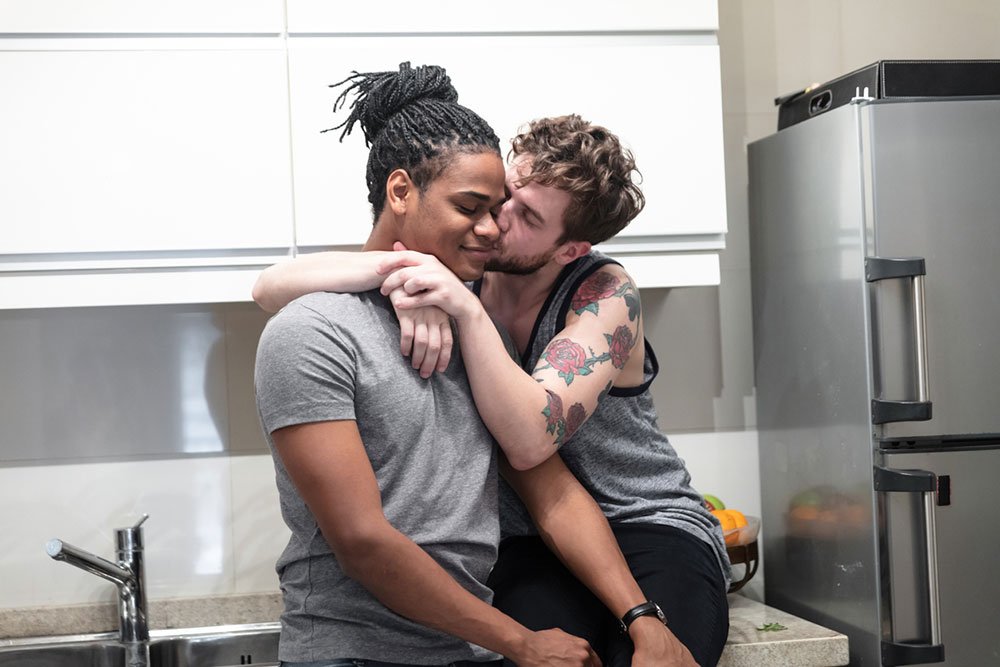Two strapping young men sat on my couch, wet boots soaking the office carpet. The heavy rain outside was nothing compared to the ways in which they felt drenched in hopelessness. Both toiled over the consideration that an open relationship might be right for them. In their differing approaches to opening the relationship, one experienced the lack vitality and sexual freedom like a wet blanket that smothered his youthful soul, while the other felt trapped in a wetsuit he couldn’t shake off. The tension in his chest was all too consuming. He was panicked that he’d be left behind, that his partner would love a third more than him.
Maybe you see yourself in one of the young men who ran out of the storm and into my office. You, too, may be considering opening your relationship with the perception that it will liberate a long-forgotten vitality or long-gone sense of sexual thrill. Perhaps you’re scared that opening a relationship could be the beginning of the end.
As an attachment-focused clinician who has worked with individuals of open relationships, I have seen two predominant motivators for open relationships.
First, it may be that one or both of you is approaching an open relationships from a place of security, feeling profoundly steadfast and confident in the longevity of your relationship. With the test of time on your side, you or your partner may be looking to augment experiences of love, sex, and thrill. I assume that couples who want to expand their abilities to love and be loved have an earned secure attachment and deep relational esteem that can withstand the weight of an expanded emotional world. Lovers with high relational esteem are stable in their relationship and feel deeply connected, so that the love for a third or someone outside the relationship is non-threatening. Couples who know this type of steadfast love can be one another’s cheerleaders, celebrating their loved one’s love from the sidelines, like a spectator who wants their home team to win.
In such a context––with an earned secure attachment and deeply rooted relational esteem––open relationships bring new tricks to the bedroom, perspectives that deepen relational intimacy and fresh air that enlivens the otherwise mundane routines of adulting. Certain agreements, sexual expressions and relational habits that were once fixed or off the table are now up for conversation again.
One alternative to such a stable love story is when one or both partners feel as though the wells of emotional and sexual intimacy have grown thin, dried up by hollow gestures, patterned resentments and petrified disappointments. Motivated by the fear that the relationship could be more of a trap of stale love, these partners often enter an open relationship seeking remedy for their pain.
Physiologically, we know the early passion in most relationships gradually fades The dopamine and serotonin cocktails our brains create give way to partnerships and everyday routines. (Little wonder that the Greeks separated Eros, the god of passion, from his mother Aphrodite, the goddess of committed love!)
Some people in committed relationships, wanting to keep their stability in place and feel alive again, began fantasizing about romance, thrill, and enticing sexual encounters that can tickle their fancies. Striking a deal within themselves––and possibly their relationship––these partners feel as though an open relationships is just the trick. They have found a way to preserve their cake and eat it too! Although such a deal may bring some relief, if the underlying patterns that allowed the boredom to settle in are not addressed, the dryness will persist and the once-medicated pain of loneliness will turn into resentment over time, no matter who the lover(s) are.
It is very common for people who opened their relationships out of fear, loneliness or pain find themselves in one of the following three categories.
The first is the insecure and scared partner who experiences jealousy and insecurity. They are certain that their partner might love someone else more, leaving them disposable and alone. These lovers may panic and self-medicate to reduce their anxiety. They often agree to an open relationship with fear and trembling.
Do you experience anxiety because of your open relationship? We’re here to help.

Second, are the lovers who are too willing to detach from their primary relationship. The relational environment was too dry and empty; the compromises, too great. Opening the relationship is a fortuitous exit and they are quick to take a peaceful landing in an otherwise a turbulent relationship.
The third is the lover who cannot make up their mind because they have not acknowledged their fear, loneliness or pain. Confused by their own desires, these lovers will be present for a spell and then gone like a thief in the night. With one foot in, they may pepper you with seductive words to convince you to stay. And with the other foot out, they leave you wondering if you really ever mattered. The whiplash of their ambivalence is painfully exhausting. Ultimately, they will need to reckon with their emotions, before they can be fully present with anyone else.
Knowing the context from which you consider opening your relationship allows you to answer these deeply important questions:
Is opening my relationship about love or fear?That is, might you be making the decision to open their relationship out of the fear of emotional depletion rather than out of love for self and others?
As couples familiarize themselves with their context, one of the first things I recommend is to open up a conversation, not the relationship. Talk about emotional intimacy within the relationship. If the relational climate is dry, if vulnerability isn’t shared or passion is absent, the couple will benefit from reigniting emotional vulnerability. Feeling the relational thermometer reach warm temperatures once again may calm the lonely-forever fears and return the couple back to passion, thrill and romance. Before you enter a relational storm with torrential downpours, set your relational climate with honesty, vulnerability and the power to love yourself and others well. From such an open, honest and sturdy place, an open relationship will have the best chance for success.
Do you need help finding what’s right for you? We’re here to help.


